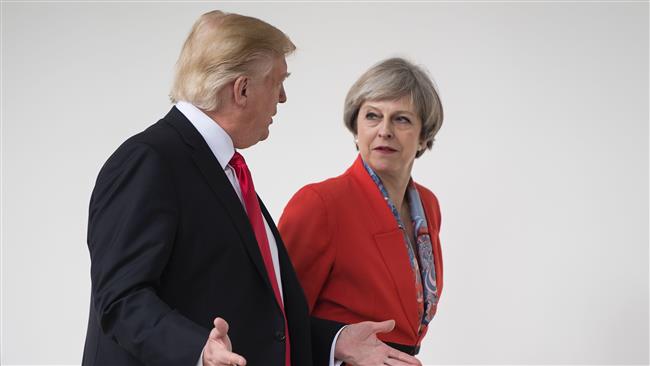UK petition to halt zionist Trump’s visit gains over one million signatures


More than one million people in Britain have signed a petition urging the UK government to withdraw an invitation for US President Donald Trump to visit London and meet Queen Elizabeth.
The petition to halt Trump’s visit was started in November, months before UK Prime Minister Theresa May visited the White House. During her visit on Friday, May extended the invitation for a state visit to Trump.
But the campaign gained momentum after the new Republican president imposed a 90-day entry ban on citizens from seven Muslim-majority countries. Trump is set to visit Britain later in the year.
So far, the petition has passed one million names. Once a petition passes 100,000 signatures, members of parliament must consider it for debate.

“Donald Trump should be allowed to enter the UK in his capacity as head of the US Government, but he should not be invited to make an official State Visit because it would cause embarrassment to Her Majesty the Queen,” the petition said.
British lawmakers from the governing Conservative Party and opposition Labour Party have criticized Trump’s action, with Labour Leader Jeremy Corbyn saying the visit should be canceled.

“Donald Trump should not be welcomed to Britain while he abuses our shared values with his shameful Muslim ban and attacks on refugees’ and women’s rights,” Corbyn told ITV on Sunday.
However, Downing Street has rejected calls to cancel the trip.
A source told the BBC that a rejection would be a “populist gesture,” adding that the invitation had been accepted and scrapping it would “undo everything.”
Tens of thousands of people have gathered in cities and airports across the US to protest Trump’s executive order on immigration.
A global backlash against Trump’s immigration policy also gained momentum on Sunday as several countries including long-standing US allies criticized the measures as discriminatory and divisive.
German Chancellor Angela Merkel said the global fight against terrorism did not justify “putting people of a specific background or faith under general suspicion.”
Merkel’s sentiments were echoed in London and Paris. “Divisive and wrong to stigmatize because of nationality,” British Foreign Secretary Boris Johnson tweeted, while his French counterpart Jean-Marc Ayrault said, “Terrorism knows no nationality. Discrimination is no response.”







